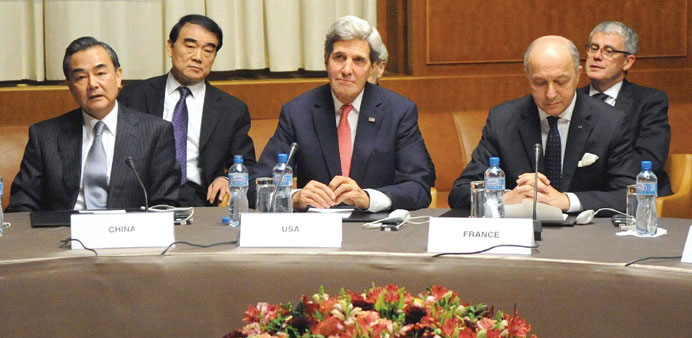|
Tehran’s official government reaction and the buzz of Iranian public opinion appear to be genuinely converging around the news of the initial Geneva agreement on Iran’s nuclear program. |
The optimism goes well beyond the nuclear aspects of the deal - firstly, the almost immediate relief from sanctions expected to improve the economy and the quality of life for virtually all the citizens of Iran.
But there are even farther-reaching questions about the impact of the deal: first, whether it will herald the beginning of the end of the decades-long hostility between the West and the regime born from Iran’s 1979 revolution; and secondly, if the Geneva accord marks a definitive turning point in President Hassan Rohani’s attempt to bring a new air of openness to Tehran’s internal politics and society.
Though time will tell on both fronts, the deal again reminds Iranians of the connection between foreign and domestic policy.
The November 24 accord between Iran and the six world powers calls for curbing Iran’s controversial uranium-enrichment activities in exchange for lifting some of the sanctions that have half-crippled Iran’s economy.
Sanctions had begun their “downward slope,” as the head of the Iranian parliament’s foreign affairs committee Alaeddin Borujerdi said, just as Persian media reported on the declining prices of gold coins and foreign currencies.
The price fluctuations are indicators of how Iranians perceive the future at any given time. For the West, the aim of the Geneva talks was above all to stop Iran from enriching uranium on a scale that would allow it to make bomb-grade material. At the same time, Iranian politicians insist the deal still recognises Iran’s “right” to enrich uranium for a peaceful nuclear programme.
Many observers view the agreement as going beyond the nuclear dossier. Sadeq Zibakalam, a Tehran University lecturer, told Irna that “the history of the Islamic Republic of Iran will be divided into before and after the Geneva accord”, and it was comparable in significance to the 1979 revolution that toppled Iran’s monarchy.
“The importance of Geneva is not really in the nuclear issue but in the divide that has taken shape in facing America and the West,” Zibakalam said, adding that the deal heralded a “line of moderation” on Tehran’s part.
Zibakalam said he believed that ordinary Iranians and Americans would welcome the deal, while regime opponents, “radical currents and the royalists”, were probably going into “mourning”.
Another Tehran-based academic, Davud Hermidas-Bavand, told Irna that with this deal, President Rohani was honouring the promises he made to voters - to improve domestic conditions and ease their lives - when he was elected in August 2013. Hermidas-Bavand described this as a “win-win” deal and a “landmark” in Iranian foreign relations.
“We must make every effort to move, with domestic support, toward a final deal in six months,” he said.
The conservative Tehran newspaper Jomhuri-e Eslami contrasted the Rohani government in its November 25 editorial with former president Mahmud Ahmadinejad, better known for his populist antics and provocative speeches at the UN General Assembly than for making deals.
The nuclear accord, the newspaper observed, showed “moderation” and represented “the victory of reason”.
It wrote: “We could have had a deal like this years before”, were it not for the fact that officials of the Ahmadinejad government “did not have or use reason”.
It separately warned that domestic opponents of the deal now had “no choice but to be quiet” given the Supreme Leader’s approval of the deal, and that continuing to “obstruct” the Rohani government would place them beside regime opponents.
Iran’s delegation was reportedly given a “spontaneous, enthusiastic” welcome at Tehran’s airport, according to the official Irna news agency, and it may have been no exaggeration this time.
Regular passengers and awaiting relatives at the airport are just the kind of Iranians anxious for economic prosperity and keen to welcome diplomats working to better their lives and end Iran’s pariah status.
Activist Soussan Tahmasebi wrote on Twitter that several friends went to the airport to welcome the delegation and that many there particularly cheered Foreign Minister Mohamed Javad Zarif.
The foreign minister told Iranian television at the airport that, according to the deal, “no nuclear substance” would leave Iran and “no nuclear centre will be closed”, Fars news agency reported. President Rohani had earlier told the cabinet that the deal was a step toward “breaking the ice” with the West while respecting Iran’s enrichment “rights”, Fars reported.
Rohani and other officials made a point of praising the role of Iran’s Supreme Leader Ayatollah Ali Khamenei in the talks’ outcome. Indeed, there would have been neither flexibility on Iran’s part, nor talks and goodwill without Khamenei’s tacit approval. Former Iranian president Akbar Hashemi-Rafsanjani said in Tehran that Khamenei’s support ensured negotiators could “speak freely” in Geneva, Irna reported.
He said Khamenei had “thanked the negotiating team and that has put an end to the matter”, implying there could be no opposition to the deal from hard-line elements, who usually follow the Supreme Leader’s guidelines.
Now, as negotiators look toward to the next phase of talks six months from now, Iranians inside and outside the country will be watching to see if the warming relations with the West and easing of economic sanctions will trigger groundbreaking political changes inside the country.

